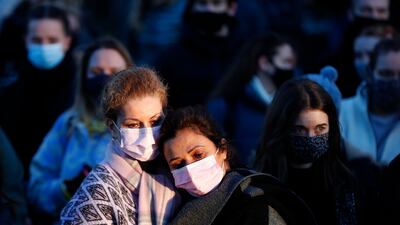The prosecution of six people who attended a vigil for murdered Sarah Everard has been dropped after months of criticism against the handling of the case by the police.
Ms Everard, 33, was abducted, raped and killed as she walked home from a friend’s house in London in March 2021. Her killer, Wayne Couzens, was a serving Metropolitan Police officer. He pleaded guilty to murder and is serving life in prison with no chance of parole.
A planned socially-distanced vigil in Ms Everard's memory had been banned by police because they said it would breach coronavirus restrictions, but hundreds gathered anyway on Clapham Common, near where she was abducted.
The Metropolitan police response to the vigil and the subsequent treatment of attendees led to a wave of criticism of the London police force and its attitude towards women’s safety.
Scuffles broke out when police officers tried to break up the vigil after several hours.
Footage showed women being handcuffed on the ground and led away by officers.
A total of nine fixed penalty notices were handed out by the Met after the vigil.
Six people were subsequently charged and faced possible fines of up to 10,000 ($12,100) for allegedly breaking Covid-19 restrictions in place at the time.
Organisers took the police force to court, and in February a judge ruled that police acted unlawfully when they used coronavirus restrictions to ban the vigil.
The six accused were due to stand trial in November. Several of them had already been convicted without their knowledge via a new fast-track system. They subsequently appealed against the decisions and secured full hearings.
On Sunday the Crown Prosecution Service said that cases against the six had been dropped because “our legal test for a prosecution was not met.”
Pippa Woodrow, a lawyer for some of the women, said she was delighted “that this ordeal is over and that the [prosecution service] has recognised they should never have been prosecuted.”
“It is to be hoped that the Met will now turn its focus and resources towards protecting women from violence rather than seeking to silence those who speak up against it, and towards rebuilding the trust damaged by their decisions in this case,” Ms Woodrow told The Observer newspaper.
One of the six, Dania Al Obeid, described the decision to drop her case as a “victory”.
She is now taking legal action against the Met over its policing of the vigil and conduct towards her.
Ms Everard's murder is one of many recent killings of women in the UK that have prompted calls for more protection for women and girls.


